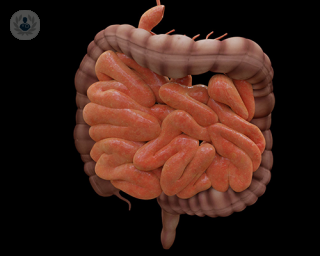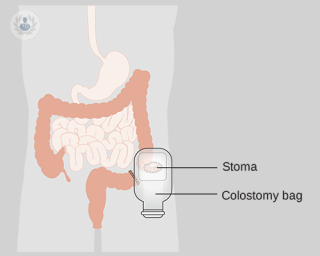Fistula
Mr Daniel Baird - Colorectal surgery
Created on: 07-24-2013
Updated on: 06-28-2023
Edited by: Karolyn Judge
A fistula is when a connection forms between an organ and another structure, and usually develop when an organ becomes inflamed or injured. Fistulas are very common in people who suffer with Crohn’s disease, an inflammatory bowel disease, with around 35 per cent of people with Crohn’s disease having at least one fistula.

What are the different types of fistula?
Fistulas can appear in numerous places in the body, but they are most commonly found around the anus. These kind of fistulas are called perianal fistulas. Another common type of fistula is the kind that develops between loops of intestine. Fistulas can also form between the rectum and vagina, between the intestine and the skin, between the intestine and the bladder, between the trachea and the oesophagus, and in other places.
What causes a fistula?
Fistulas can form in a number of different ways, depending on the type of fistula and the position. With anal fistulas, they most commonly form because of an anal abscess. If the abscess hasn’t healed properly, it can lead to the development of a fistula. It is estimated that up to 50 per cent of people with an anal abscess can then go on to develop a fistula.
Fistulas that form in the digestive tract can do so following surgery, radiation therapy for cancer, or due to a traumatic injury. Some conditions can also cause fistulas such as STIs and diverticulosis.
Some fistulas such as tracheoesophageal fistula (TOF) can form in the baby during pregnancy.
How are fistulas treated?
Surgery
Fistulas can often be repaired with surgery. The appropriate medical professional will diagnose the fistula and decide on the best course of action, depending on the kind of fistula and the position.
Draining
Another way of treating a fistula is with a catheter used to drain the fistula. These are usually used on small fistulas to control infection.
Sealing
Fistulas may also be repaired with a kind of glue called fibrin glue, which can be adopted to seal the fistula where appropriate. A plug can also be used to fill a fistula.
Medication
The symptoms of a fistula may be managed with medication in some cases, and to treat infection caused by a fistula.
Treatment for most kinds of fistula is highly successful, and it ranges from 86 per cent in complex high fistulas, 98.6 per cent for simple fistulas and 93.5 per cent in all and those associated with abscesses are managed safely and successfully by definitive surgery on the first attempt.














